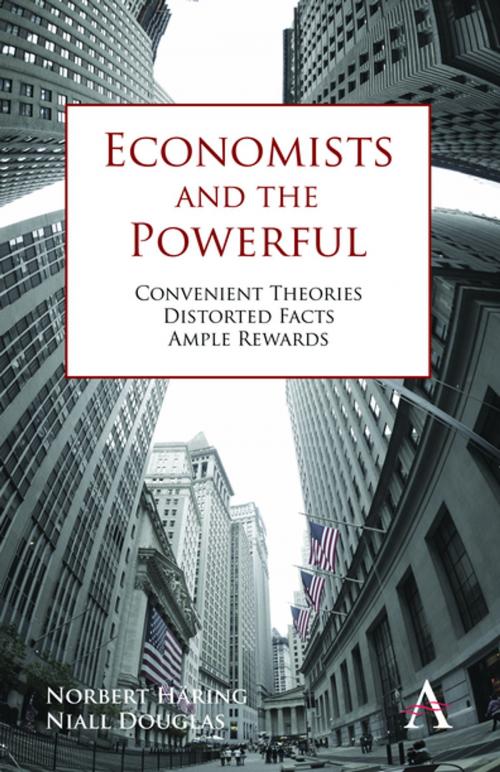Economists and the Powerful
Convenient Theories, Distorted Facts, Ample Rewards
Business & Finance, Economics, Macroeconomics, Theory of Economics| Author: | Norbert Häring, Niall Douglas | ISBN: | 9780857289193 |
| Publisher: | Anthem Press | Publication: | October 1, 2012 |
| Imprint: | Anthem Press | Language: | English |
| Author: | Norbert Häring, Niall Douglas |
| ISBN: | 9780857289193 |
| Publisher: | Anthem Press |
| Publication: | October 1, 2012 |
| Imprint: | Anthem Press |
| Language: | English |
“Economists and the Powerful: Convenient Theories, Distorted Facts, Ample Rewards” explores the workings of the modern global economy – an economy in which competition has been corrupted and power has a ubiquitous influence upon economic behavior. Based on an array of empirical and theoretical studies by a series of distinguished economists, this book reveals a stark and unpleasant truth: that the true workings of capitalism are very different from the popular myths that mainstream economics would have us believe.
By connecting the dots and coloring the resulting picture with real life examples, this work provides a groundbreaking account of the mechanics of capitalism, and demonstrates how different groups and elites consistently further their own economic interests at the expense of others. Journeys into economic history allow the reader to travel to the source of the political power enjoyed by our current-day financiers, and unveil a whole host of systematic problems – such as that our banks are the main beneficiaries of today’s unstable, debt-oriented monetary system, or that leading economists often play a role in helping CEOs massively inflate their salaries without improving their performance – that are today more pertinent, and prevalent, than ever.
To investigate these issues, “Economists and the Powerful” looks closely at the incentives pursued by economists, and explores the history of the economic doctrines supported in our current financial climate. Via this scrutinizing approach, the text approaches the most overlooked issue of all: the matter of how, when and why the questioning of power was erased from the radar screen of mainstream economics – and the influence this subversive removal has had upon the modern financial world.
For more information please see the book website: http://economistsandthepowerful.anthempressblog.com/
“Economists and the Powerful: Convenient Theories, Distorted Facts, Ample Rewards” explores the workings of the modern global economy – an economy in which competition has been corrupted and power has a ubiquitous influence upon economic behavior. Based on an array of empirical and theoretical studies by a series of distinguished economists, this book reveals a stark and unpleasant truth: that the true workings of capitalism are very different from the popular myths that mainstream economics would have us believe.
By connecting the dots and coloring the resulting picture with real life examples, this work provides a groundbreaking account of the mechanics of capitalism, and demonstrates how different groups and elites consistently further their own economic interests at the expense of others. Journeys into economic history allow the reader to travel to the source of the political power enjoyed by our current-day financiers, and unveil a whole host of systematic problems – such as that our banks are the main beneficiaries of today’s unstable, debt-oriented monetary system, or that leading economists often play a role in helping CEOs massively inflate their salaries without improving their performance – that are today more pertinent, and prevalent, than ever.
To investigate these issues, “Economists and the Powerful” looks closely at the incentives pursued by economists, and explores the history of the economic doctrines supported in our current financial climate. Via this scrutinizing approach, the text approaches the most overlooked issue of all: the matter of how, when and why the questioning of power was erased from the radar screen of mainstream economics – and the influence this subversive removal has had upon the modern financial world.
For more information please see the book website: http://economistsandthepowerful.anthempressblog.com/















